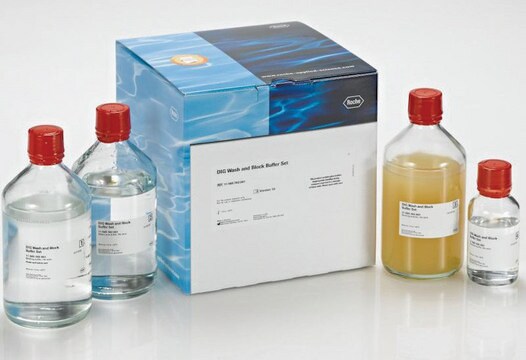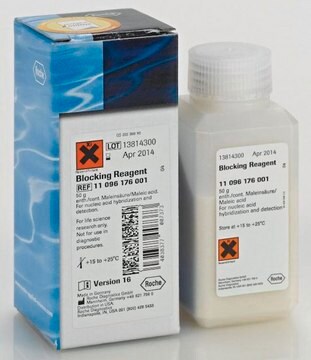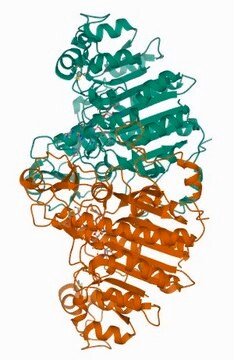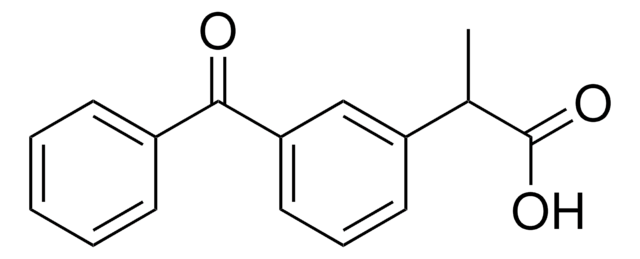PF092
Fas Ligand Plus, Human, Recombinant
Fas Ligand Plus, Human, Recombinant, consists of amino acids 103-281 fused to a 26-amino acid linker and FLAG®-tag at the N-terminus and expressed in HEK293 cells.
Se connecterpour consulter vos tarifs contractuels et ceux de votre entreprise/organisme
About This Item
Code UNSPSC :
12352202
Nomenclature NACRES :
NA.77
Produits recommandés
Produit recombinant
expressed in HEK 293 cells
Niveau de qualité
Pureté
≥95% (SDS-PAGE)
Forme
lyophilized
Fabricant/nom de marque
Calbiochem®
Conditions de stockage
OK to freeze
avoid repeated freeze/thaw cycles
Conditions d'expédition
wet ice
Température de stockage
−20°C
Description générale
Recombinant, human Fas ligand (amino acids 103-281) fused to a 26-amino acid linker and FLAG®-tag at the N-terminus and expressed in HEK293 cells. Does not require enhancer for activity. Suitable for cytotoxicity assays. M.W. 32,000 - 35,000.
Recombinant, human Fas ligand (amino acids 103-281) fused to a 26-amino acid linker and FLAG®-tag at the N-terminus and expressed in HEK293 cells. Glycosylation of recombinant human sFasL is similar or identical to natural human FasL. The molecular weight is ~32 kDa (nonglycosylated) and ~37-42 kDa (glycosylated) by SDS-PAGE under reducing conditions. The recombinant protein is produced in HEK293 cells. It does not require enhancer for activity. Useful for cytotoxicity assays.
Fas Ligand (FasL/APO-1L/CD95L) is a ~37-42 kDa type II transmembrane protein belonging to the TNF family. Interaction between FasL and Fas induces apoptosis of Fas-sensitive cells. FasL is implicated in CTL-mediated-killing, activation-induced cell death, creation of immune-privileged sites and tissue homeostasis. The extracellular domain of human FasL can be cleaved off by a metalloprotease, generating soluble FasL (sFasL). Circulating sFasL can be detected in serum of patients with melanoma and certain types of lymphoma.
Fas Ligand (FasL/APO-1L/CD95L) is a ~37-42 kDa type II transmembrane protein belonging to the TNF family. Interaction between FasL and Fas induces apoptosis of Fas-sensitive cells. FasL is implicated in CTL-mediated-killing, activation-induced cell death, creation of immune-privileged sites and tissue homeostasis. The extracellular domain of human FasL can be cleaved off by a metalloprotease, generating soluble FasL (sFasL). Circulating sFasL can be detected in serum of patients with melanoma and certain types of lymphoma.
Actions biochimiques/physiologiques
≥1 ng/ml kills Fas-sensitive cells
Avertissement
Toxicity: Standard Handling (A)
Forme physique
Lyophilized from PBS.
Reconstitution
Following reconstitution, aliquot and freeze (-20°C). Stock solutions are stable for up to 3 months at -20°C.
Reconstitute in 50 µl PBS to yield a final stock concentration of 100 µg/ml. Further dilute in culture medium with 5% FCS immediately prior to use.
Autres remarques
Ashkenazi, A., and Dixit, V.M. 1998. Science281, 1305.
Nagata, S., 1997 Cell88, 355.
Hahne, M., et al. 1996. Science274, 1363.
Bellgrau, D., et al. 1995. Nature377, 630.
Lowin, B., et al. 1994. Nature370, 650.
Russell, J.H., et al. 1993. Proc. Natl. Acad. Sci. USA90, 4409.
Nagata, S., 1997 Cell88, 355.
Hahne, M., et al. 1996. Science274, 1363.
Bellgrau, D., et al. 1995. Nature377, 630.
Lowin, B., et al. 1994. Nature370, 650.
Russell, J.H., et al. 1993. Proc. Natl. Acad. Sci. USA90, 4409.
Glycosylation of recombinant human sFasL is similar or identical to natural human FasL. The molecular weight is ~32 kDa (nonglycosylated) and ~35 kDa (glycosylated) by SDS-PAGE under reducing conditions. The recombinant protein is produced in HEK293 cells. It does not require enhancer for activity.
Informations légales
CALBIOCHEM is a registered trademark of Merck KGaA, Darmstadt, Germany
FLAG is a registered trademark of Merck KGaA, Darmstadt, Germany
Code de la classe de stockage
11 - Combustible Solids
Classe de danger pour l'eau (WGK)
WGK 1
Point d'éclair (°F)
Not applicable
Point d'éclair (°C)
Not applicable
Certificats d'analyse (COA)
Recherchez un Certificats d'analyse (COA) en saisissant le numéro de lot du produit. Les numéros de lot figurent sur l'étiquette du produit après les mots "Lot" ou "Batch".
Déjà en possession de ce produit ?
Retrouvez la documentation relative aux produits que vous avez récemment achetés dans la Bibliothèque de documents.
Notre équipe de scientifiques dispose d'une expérience dans tous les secteurs de la recherche, notamment en sciences de la vie, science des matériaux, synthèse chimique, chromatographie, analyse et dans de nombreux autres domaines..
Contacter notre Service technique








